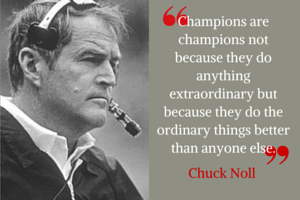Chuck Noll, the Equal Opportunity Coach
By ASLAN Training
January 10, 2016
2 min read
 The ASLAN Other-Centered® Leader
The ASLAN Other-Centered® Leader
Coaches Quiz Blog Series
Every winner has a coach, and every coach has a philosophy. The ASLAN Other-Centered® Leader Coaches Quiz matches your coaching style with some of the legendary coaches in sports. Here is a deeper look inside the philosophy of one of the best.
Chuck Noll was the head coach of the Pittsburgh Steelers from 1969-1991, leading them to four Super Bowl wins (more than any other coach) and nine AFC championships during that time. Noll was the youngest NFL head coach in history when he took over in 1969, but he showed great talent for choosing to draft players of exceptional quality, including the league's first African-American starting quarterback Joe Gilliam and first Super Bowl MVP winner Franco Harris.
Chuck Noll had many strengths as a coach. He would often take players back to the fundamentals and correct small mistakes in their techniques that would enable them to play even more exceptionally than before. He was an excellent teacher who would write detailed descriptions of plays and techniques for his players to study.
Noll also held his players accountable and didn't let them get away with doing any less than their best. "Whatever it takes," became a Noll-ism in the 1970s as the Steelers won championship after championship. Noll was quiet and didn't demand a lot of attention for himself, but he was elected into the Football Hall of Fame on the first ballot.
One mistake Noll didn't make was playing to preconceived notions about who could be a great football player. He gave everyone a chance and evaluated their attitude and willingness to do what it took to be at the top of their game.
In the ASLAN Training whitepaper "Is it Possible That What You Learned About Coaching is Wrong?" a method for giving everyone equal opportunity coaching according to their desire and willingness allows sales coaches to prioritize their time while giving everyone an equal chance.
Developing the Wrong People
Who is responsible for improving sales effectiveness - you or your rep? Obviously you are responsible for the overall results of your team - but are you responsible for a rep's willingness to improve? Absolutely not. Here's a critical principle for effective sales coaching. If you grasp this, it will not only shift the primary burden of change to your reps but will ultimately save you countless hours of wasted time spent trying to develop the wrong people:
Desire Determines Development
Change is difficult - it takes work. When a rep doesn't have the desire to do the difficult work required to reach a new level of performance, sales coaching is futile. Desire, not talent or skill, is the only ticket required to enter a coaching session. The responsibility of the sales coach/ manager is to be prepared and available - but if the rep is unwilling to put in the effort to improve, what's the point? And that means more than just going through the motions. If that's all that happens, change will never occur.
Equal opportunity doesn't mean wasting time with people who don't have the willingness to improve and learn. To quote Chuck Noll, sales coaches who are willing to do "whatever it takes" will inspire the same attitude in their sales team members with open minds and the desire to succeed.
Download the entire whitepaper here.
Unlock Your Team's Full Sales Potential
Questions? Watch our CEO, Tom Stanfill, address our frequently asked questions below.

